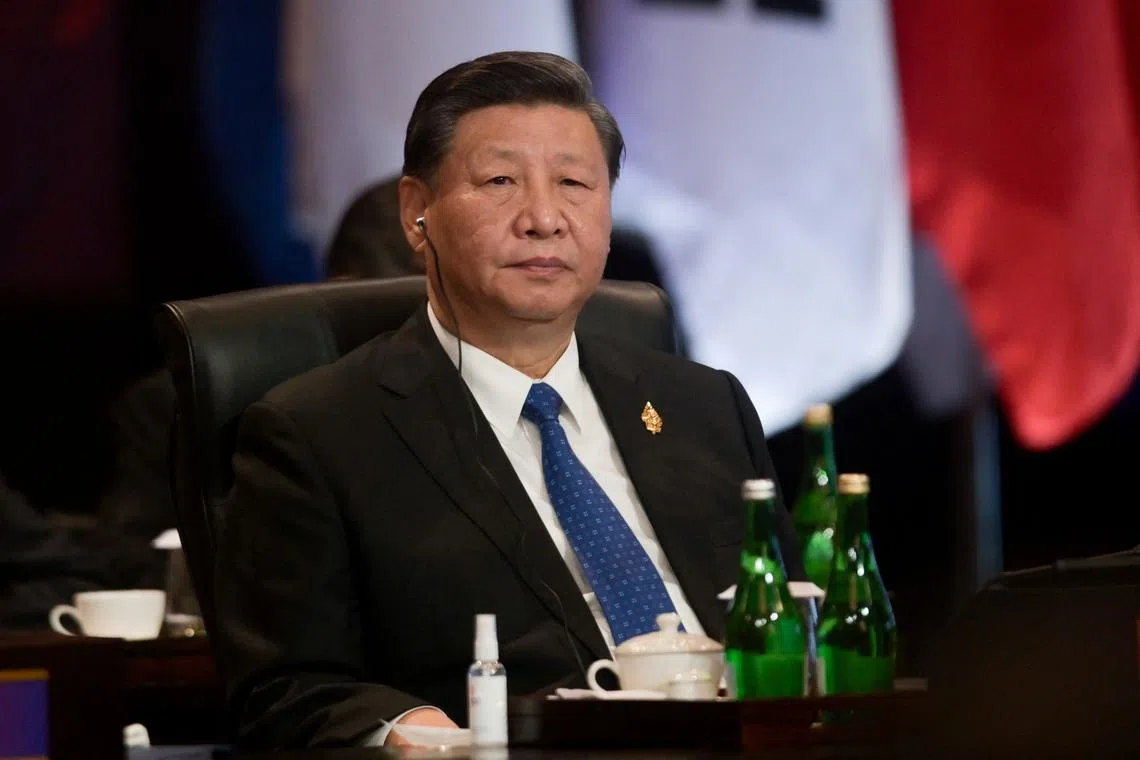Xi says Asia-Pacific is ‘no-one’s backyard’, rejects attempts to politicise trade and economic relations
Sign up now: Get insights on Asia's fast-moving developments

China's President Xi Jinping during the opening of the G-20 Leaders' Summit in Bali on Nov 15, 2022.
PHOTO: REUTERS
Follow topic:
BANGKOK - Chinese President Xi Jinping said the Asia-Pacific would not stand for any attempt to wage a “new Cold War” in the region, which is “no one’s backyard”, as he called for deeper, non-discriminatory cooperation among regional countries on Thursday.
“The Asia-Pacific is no one’s backyard and should not become an arena for big power contests. No attempt to wage a new Cold War will ever be allowed by the people or by our times,” he said in written remarks to regional and business leaders at the Asia-Pacific Economic Cooperation (Apec) CEO Summit.
Mr Xi also urged the region to strive for “higher-standard connectivity”, in the remarks that were distributed by the Chinese embassy in Thailand.
“China will actively enhance the complementarity between the Belt and Road Initiative and the development strategies of other parties to jointly build a high-quality Asia-Pacific connectivity network,” he added.
Mr Xi, who had a series of high-profile meetings with international leaders this week, was due to speak at the summit, but his in-person speech was cancelled due to scheduling conflicts, said meeting organisers.
“Unilateralism and protectionism should be rejected by all; any attempt to politicise and weaponise economic and trade relations should also be rejected by all,” his remarks read.
While he did not name the United States in particular, the Asia-Pacific region has seen growing economic and political rifts between China and the United States result in heightened tensions.
Earlier this week at the Group of 20 (G-20) Leaders’ Summit in Bali, Indonesia, Mr Xi had called for inclusive development and slammed “group politics and bloc confrontation”.
He also held an ice-breaking meeting with US President Joe Biden
Arriving in Bangkok on Thursday ahead of the Apec Economic Leaders’ Meeting on Friday and Saturday, Mr Xi held meetings with several regional leaders, including Singapore’s Prime Minister Lee Hsien Loong and Japan’s Prime Minister Fumio Kishida.
He is due to meet New Zealand leader Jacinda Ardern on Friday, and Thai Premier Prayut Chan-o-cha on Saturday.
On Thursday, US Secretary of State Antony Blinken said maintaining open lines of communication between the US and China is vital to avoid conflict and work together on challenges like the climate crisis and health security.
“Neither of our countries, or any other for that matter, can solve (these challenges) alone,” he said, addressing reporters after the Apec ministerial meetings.
US Trade Representative Katherine Tai also said that the current geopolitical fallout and climate crisis have shaken people’s confidence in the global economic system, and Apec is in a position to build more durable and resilient economies.
In particular, the US is committed to working with Apec economies in two areas – protecting the environment and addressing shared challenges like supply chain disruptions and economic inequality.
“The right trade policies can facilitate access to lower-emission goods and services, promote investment and climate-friendly technologies and help incentivise environmental protection,” she said.
During the Apec ministerial meetings, which are a precursor to the Apec leaders meeting, ministers from the 21 member economies agreed to pursue sustainable economic growth as they worked towards a free trade area in the Asia-Pacific.
According to Thailand’s Deputy Prime Minister and Minister of Commerce Jurin Laksanawisit, the ministers agreed to drive forward the Thailand-originated Bio-Circular-Green Economy Model, under which science and technology are applied to make efficient use of resources and restore the environment, and to help businesses to thrive.
The Bangkok gathering is the last of three summits that have drawn global leaders to South-east Asia over the past week. The first was the Asean summits in Phnom Penh, which concluded on Nov 13, followed by the G-20 summit in Bali that ended on Wednesday.
Discussions on post-pandemic economic recovery at these forums have been clouded by increasingly brittle US-China ties and the Ukraine-Russia war, which has caused prices of food, fuel and agriculture products to spike across the world.

